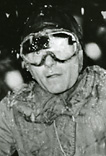 Reggie Pink was a key figure in motorcycling from the 1920s to his death in 1962. Pink is best known for becoming the first major importer of British motorcycles to the United States in the 1920s. A racer, a motorcycle dealer and an AMA official, Pink was one of leaders of the sport and helped formulate rules for Class C racing, which became the basis for today's AMA Grand National Series and AMA Superbike Championship. Pink was one of the best loved personalities in motorcycling and devoted his colorful and exciting career to the sport.
Reggie Pink was a key figure in motorcycling from the 1920s to his death in 1962. Pink is best known for becoming the first major importer of British motorcycles to the United States in the 1920s. A racer, a motorcycle dealer and an AMA official, Pink was one of leaders of the sport and helped formulate rules for Class C racing, which became the basis for today's AMA Grand National Series and AMA Superbike Championship. Pink was one of the best loved personalities in motorcycling and devoted his colorful and exciting career to the sport.
Born in New York City on April 23, 1899, Pink was an adventurous young boy. Once he made a home-made kite plane and tried to fly out of a second-story window on it. At the age of 16, Pink went to work as a mechanic and sales boy for a Reading Standard dealer. It was during this time that he started his long and fruitful competition career. In 1917, riding a Reading Standard, he won a 260-mile endurance run from Yonkers to Albany and back. Pink quickly became successful in endurance runs, trials, hillclimbs, board tracks and other motorcycle racing contests.
Pink joined the Crotona Motorcycle Club in 1918 and began a lifetime of service to the club. In 1921, Pink won a highly publicized 30-hour endurance run promoted by his home club.
In the mid-1920s, Pink began competing on a British-made BSA machine. By 1927, Pink had opened a dealership in New York, which became one of the first ever to import British brands. He became one of the country's top hillclimbers on his Douglas and Velocette motorcycles. He also was an early and vocal advocate for AMA racing to conform more to European racing rules. He called for U.S. racing to be based on 250cc and 500cc motors. Pink's views were certainly in the minority, yet he was elected to the AMA's Competition Committee in 1928. He was instrumental in helping form the rules for the AMA's Class C racing which came into being in 1933.
Pink went to England in 1928 to tour the various factories of the motorcycle manufacturers. While there he won a British hillclimb event. Pink's racing here in the U.S. was covered extensively in the British press, since he was competing on British machines.
One of Pink's biggest projects was attempting to promote a 200-Mile AMA National Championship race in New York's Central Park in 1933. Pink worked countless hours trying to pull together all the concerned parties to put the event together. After over a year of work and planning, the proposed event had to be canceled at the 11th hour after safety concerns were raised by local residents. Despite the failure of the event, New York City officials recognized considerable organizational skills and he became one of the founders of the Metropolitan Sports Committee, which organized sporting activities in the New York City area.
Among his numerous talents, Pink also became a regular writer on the pages of Motorcycle and Bicycle Illustrated. His writings ran the gamut from racing coverage to editorials on a variety of subjects. In 1929, he inaugurated the famous "Pink-O-Gram" newsletters which highlighted the achievements of riders who raced British-made motorcycles and were popular across the country.
During the 1940s, Pink opened two Harley-Davidson dealerships in the New York City area. He also became treasurer for the Metropolitan Harley-Davidson Dealers of New York. Pink was an early advocate of road racing in this country. He served as publicity director for the Bridgehampton (New York) road races as well as the Crotona Motorcycle Club.
Pink's eldest son, Donald, became a top racer during 1950s. Don won the 1953 AMA Endurance National Championship at the famous Jack Pine Enduro. Another son, Rod, became a top New York-area road racer during the late '60s.
Pink died on February 15, 1962 at the age of 62. He was survived by his wife, Bernese, and three sons, Donald, Douglas and Rodney, and one daughter, Donna. In 1979, Pink was honored posthumously by the AMA with the Dudley Perkins Award for his lifetime achievements in motorcycling.
Inducted in 1998